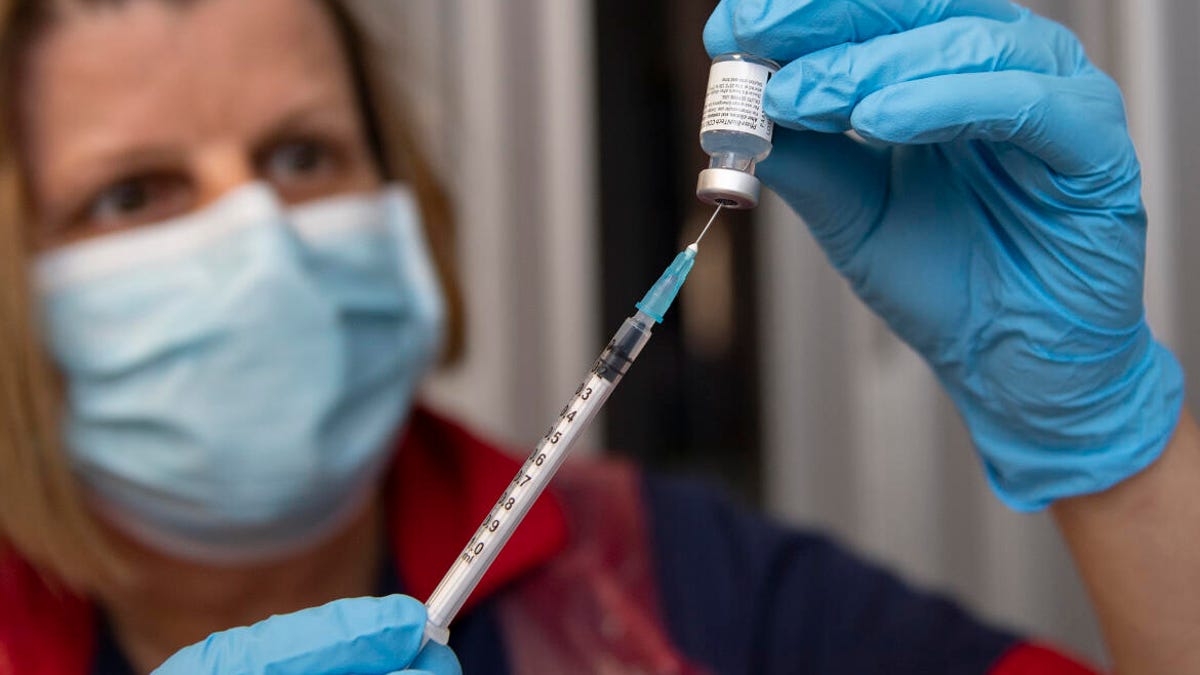FDA authorizes Pfizer's COVID-19 vaccine for emergency use
Vaccinations could start as soon as next week.

The COVID-19 vaccine is on its way in the US, after already starting its rollout in the UK earlier this week (above).
The Food and Drug Administration has granted emergency use authorization to pharmaceutical giant Pfizer to distribute its COVID-19 vaccine in the US, the FDA announced late Friday, making it the first vaccine against the novel coronavirus to be given the green light for use in the country. Vaccinations could begin within days.
"The FDA's authorization for emergency use of the first COVID-19 vaccine is a significant milestone in battling this devastating pandemic," said FDA Commissioner Stephen M. Hahn.
"Today's action," Hahn continued, "follows an open and transparent review process that included input from independent scientific and public health experts and a thorough evaluation by the agency's career scientists to ensure this vaccine met FDA's rigorous, scientific standards for safety, effectiveness, and manufacturing quality needed to support emergency use authorization."
The official emergency use authorization comes after a daylong FDA meeting on Thursday during which an advisory panel formally recommended the agency authorize the vaccine.
Pfizer, which developed the vaccine with German partner BioNTech, said last month the vaccine demonstrated 95% effectiveness in clinical trials.
Given that there are more than 330 million people in the US, not everyone will immediately be able to get the vaccine, which is given in two doses. Health care workers will be prioritized, as well as people at higher risk of infection due to age, underlying conditions or profession. Pfizer has said it expects to produce up to 50 million vaccine doses in 2020 and 1.3 billion in 2021.
Today, FDA issued the first emergency use authorization (EUA) for a vaccine for the prevention of #COVID19 caused by SARS-CoV-2 in individuals 16 years of age and older. The emergency use authorization allows the vaccine to be distributed in the U.S. https://t.co/1Vu0xQqmCB pic.twitter.com/c8maeePP9O
— U.S. FDA (@US_FDA) December 12, 2020
Earlier on Friday, Secretary of Health and Human Services Alex Azar said his agency would work with Pfizer to get the vaccine shipped out.
"We could be seeing people getting vaccinated Monday or Tuesday of next week," Azar said on Good Morning America.
The vaccine is administered as a series of two doses, three weeks apart.
Pfizer's vaccine -- as well as another from US drug developer Moderna, which is said to be 94% effective -- is an experimental RNA vaccine. It uses synthetic messenger RNA, or mRNA, a molecule that tells cells how to build proteins. It can then trick cells into producing proteins typically found in SARS-CoV-2, the virus that causes COVID-19, which in turn can then stimulate the immune system, without making patients sick, to protect against infection. Moderna has also applied for FDA emergency approval for its coronavirus vaccine.
On Tuesday, the UK became the first country to start administering the Pfizer COVID-19 vaccine, following clinical approval. The first person to receive the vaccine outside of a clinical trial was 90-year-old Margaret Keenan, who was given the first of two injections needed. Four million people in the UK are expected to begin the process by the end of December. Canada approved Pfizer's vaccine on Wednesday.
There are several dozen coronavirus vaccines in various stages of clinical trials, with some almost ready to be submitted for potential authorization. Most experts say we'll have many more ready to distribute by early 2021.
The first cases of COVID-19 were reported in China a year ago this month. By March, a pandemic was in full force. According to the Johns Hopkins coronavirus dashboard, more than 69 million cases have been confirmed worldwide and nearly 1.6 million people have died of COVID-19 as of Thursday.



